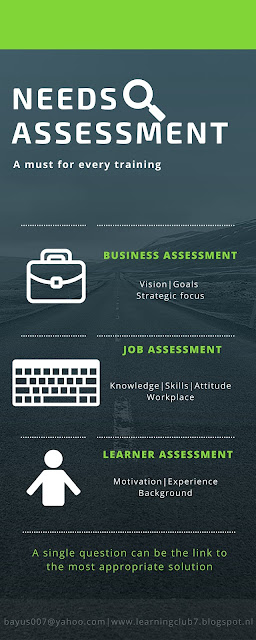Developing your training skills: The art of classroom management (Part 3)

Input from http://www.ascd.org/publications/educational-leadership/sept03/vol61/num01/The-Key-to-Classroom-Management
Part 1 focused
on general points for classroom management and part 2 looked at maintaining an
appropriate level of cooperation. Part 3 will focus on high-needs
students. We will learn to identify them and appropriate response
Types of
high-needs participant
|
How to identify them
|
Appropriate response
|
Passive
|
Fear of
relationships
Very shy;
avoid connection with other; never initiates conversation with others;
attempts to be invisible
Fear of
failure
Gives up
easily; easily frustrated and uses negative self-talk
|
-
Provide a safe environment to speak and interact;
- Protect from
aggressive participants;
- Boost
their self-esteem with positive talk
|
Aggressive
|
Hostile: Rages,
threatens or intimidates
Oppositional: Never
follows the rules
Covert: Appears to
agree but does the opposite
|
- Be
assertive about appropriate behaviour. -
Never take sides but be professional in your approach towards them.
- Never get angry with them.
|
Attention problems
|
Hyperactive: Fidgets,
leaves seat frequently or talks excessively
Inattentive: Has
difficulty staying focused and following through on projects. Hardly listen, remember and never organized
|
- Have a
talk with the participant on their behaviour;
- Help them
with these behaviour.
Hyperactive:
- Insist
on appropriate behaviour based on set norms
Inattentive:
- Draw
their attention by calling their names to answer a question or participate in
a task.
- Be
patient with them as they try to remember.
- Never embarrass them.
|
Perfectionist
|
Very
self-critical; tend to focus too much on the details. Focus on results not
relationship
|
- Never
laugh at their mistakes but tell them it is normal to be vulnerable.
- Allow them to help others and sometimes
- Allow
them to make mistake on purpose and encourage them that it is perfectly
normal to be vulnerable.
|
Social inept
|
Attempts to
make friends but unsuccessful so they stay alone. Often with unusual
behaviour and appearance.
|
- Help
them with it through participation in small or large group discussion.
-
Encourage another participant to be a friend
|

Comments
Post a Comment